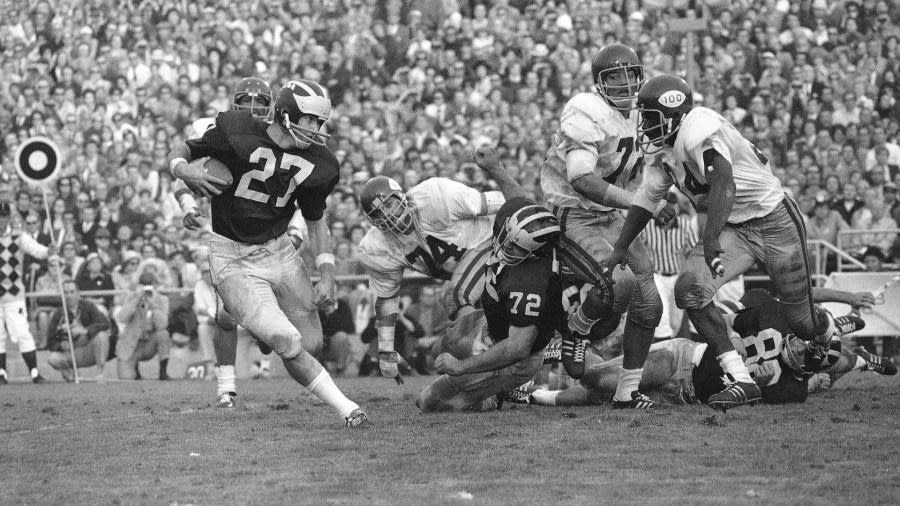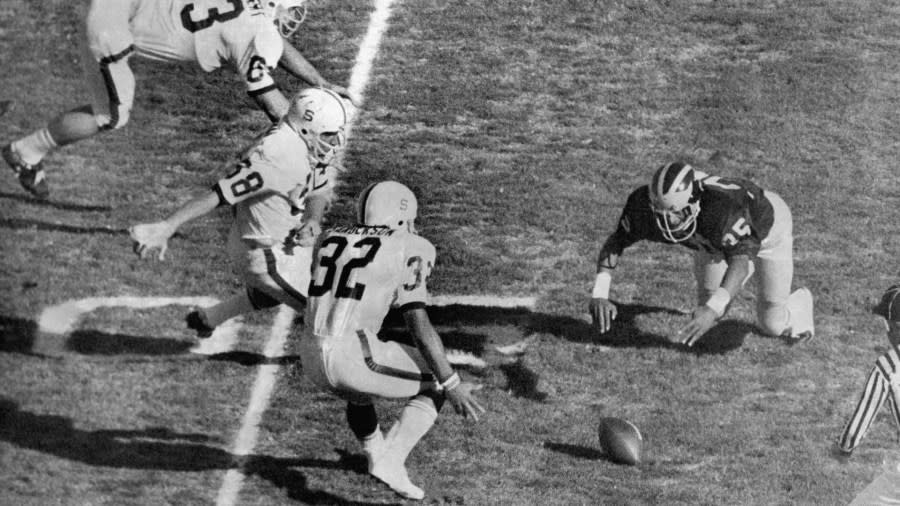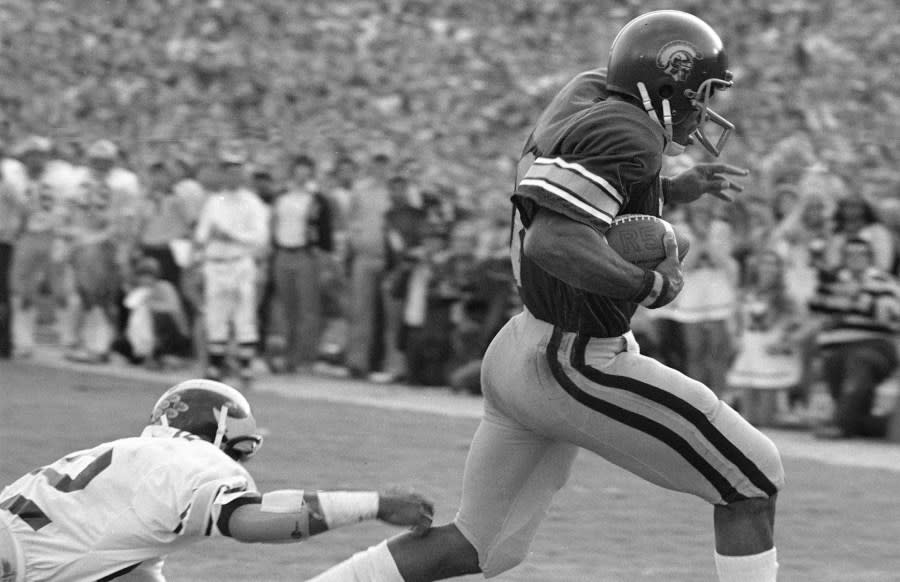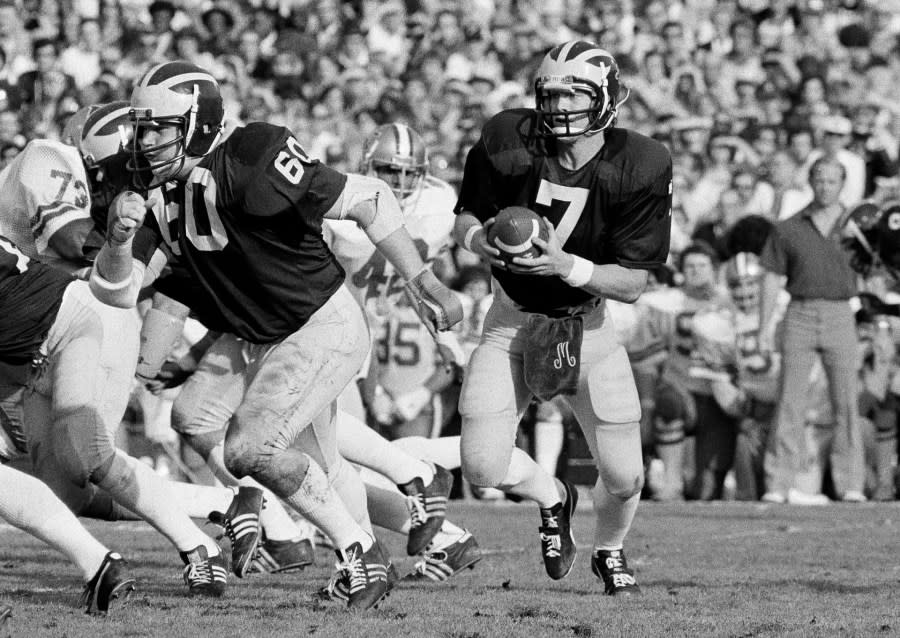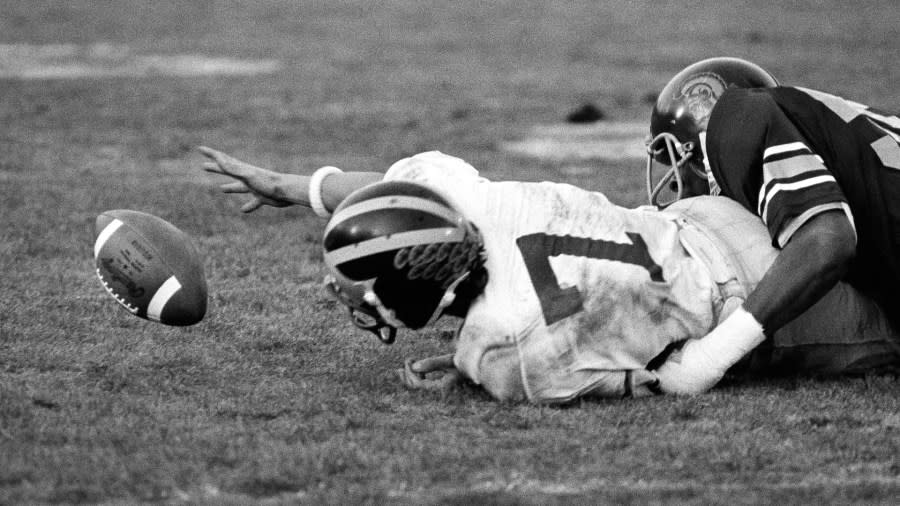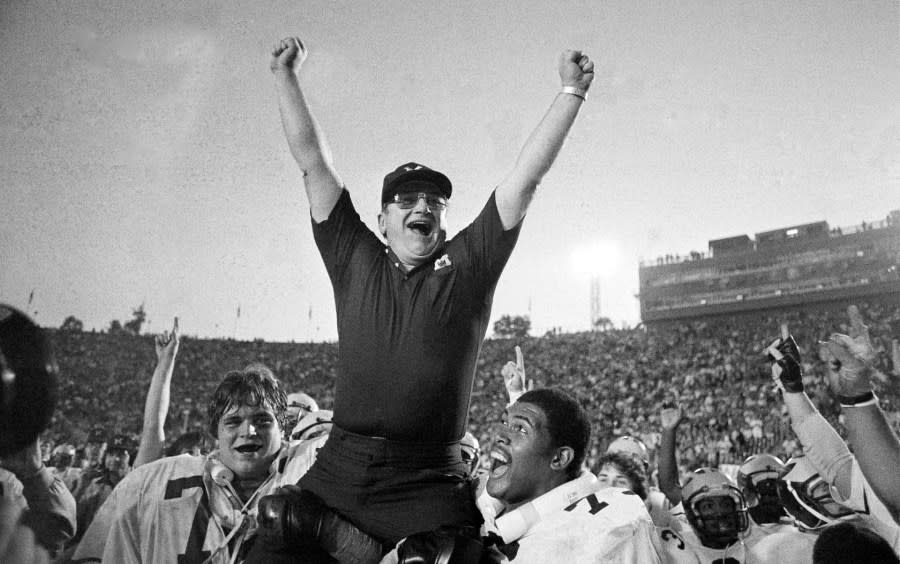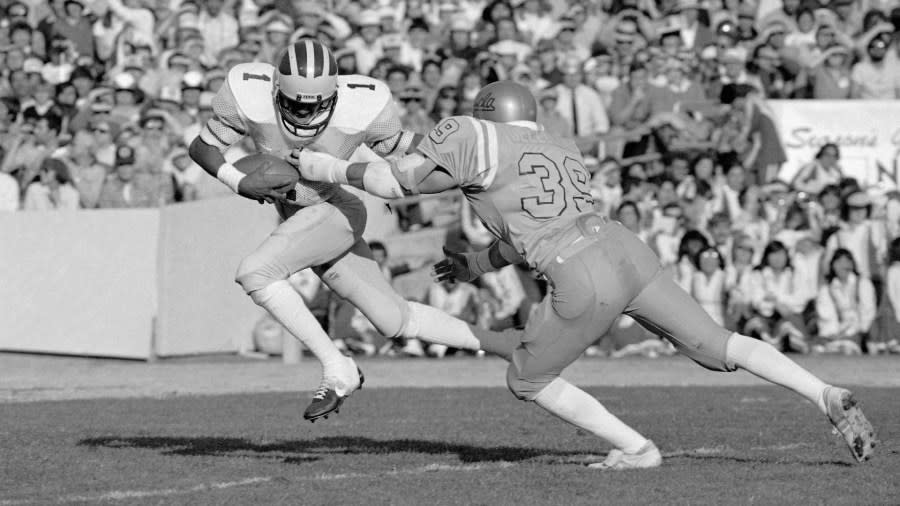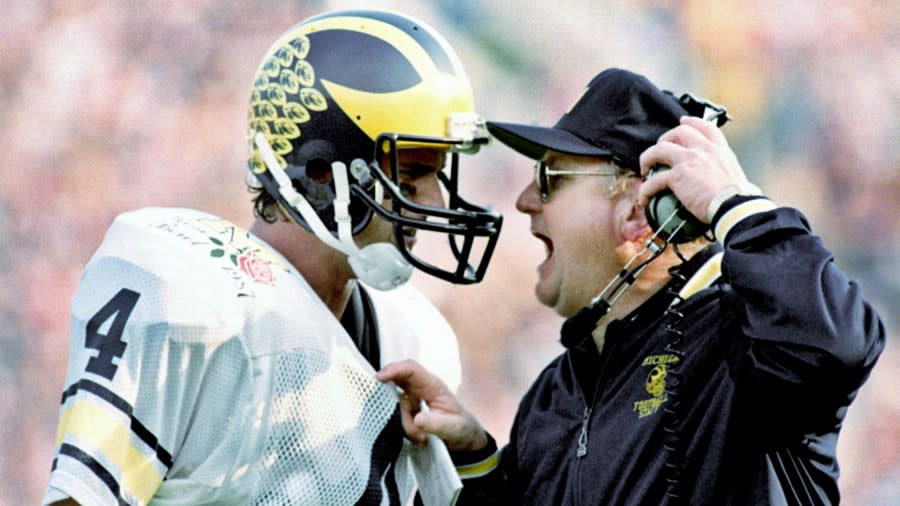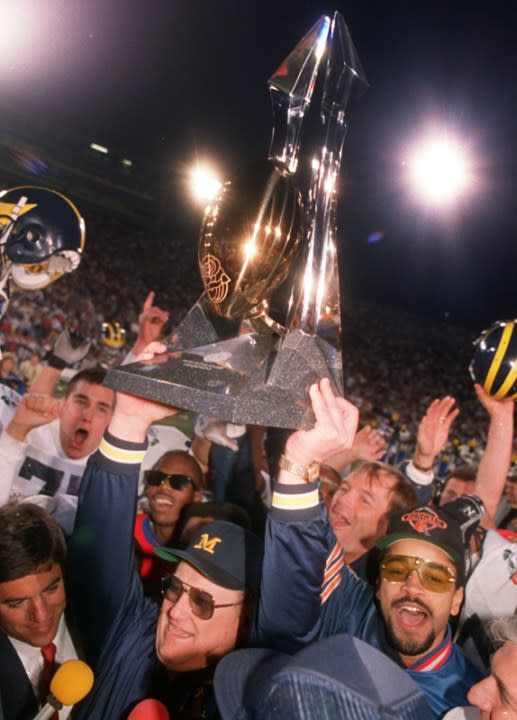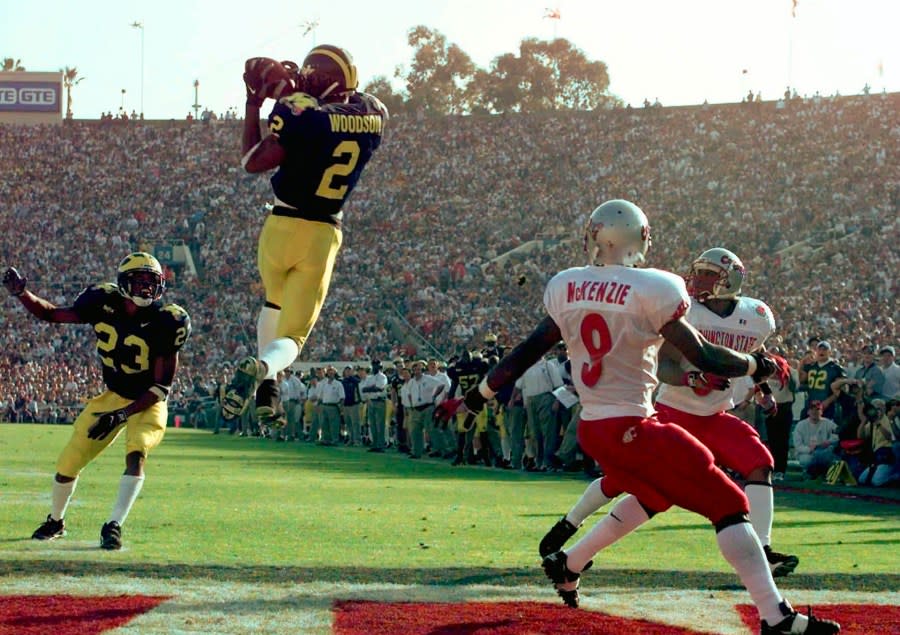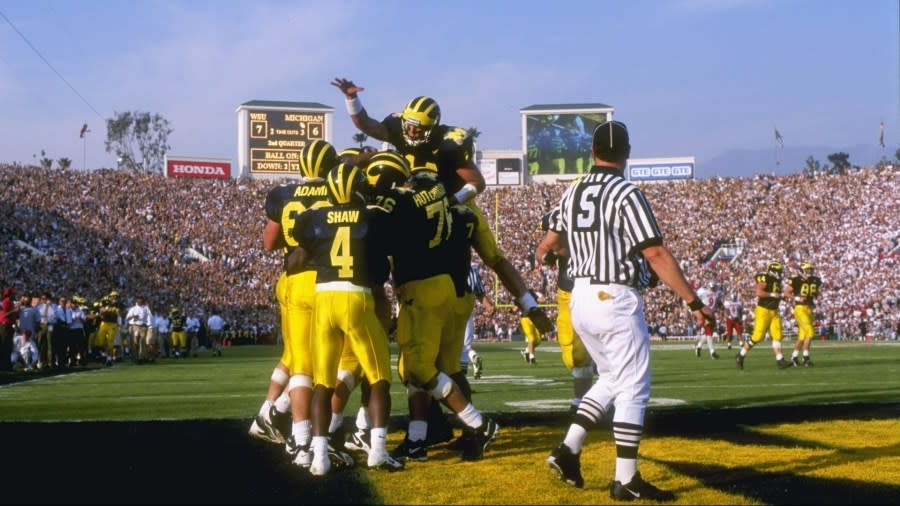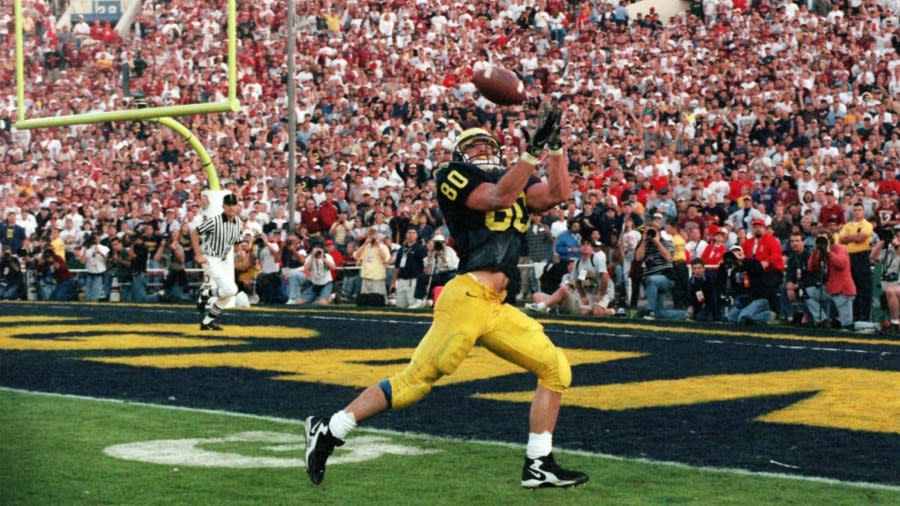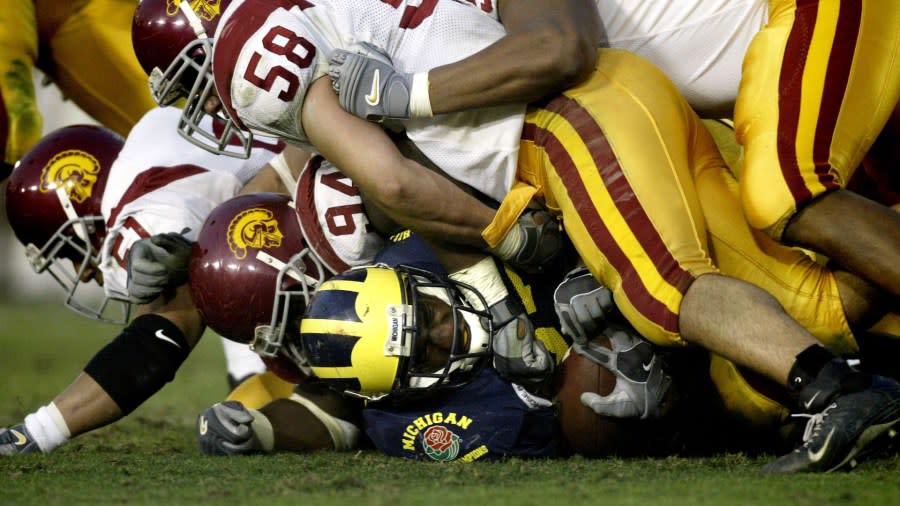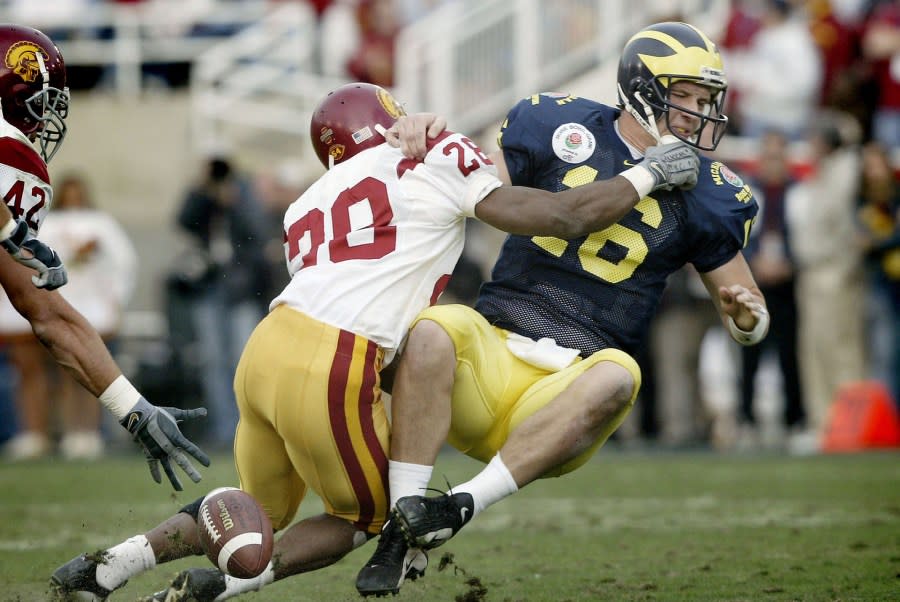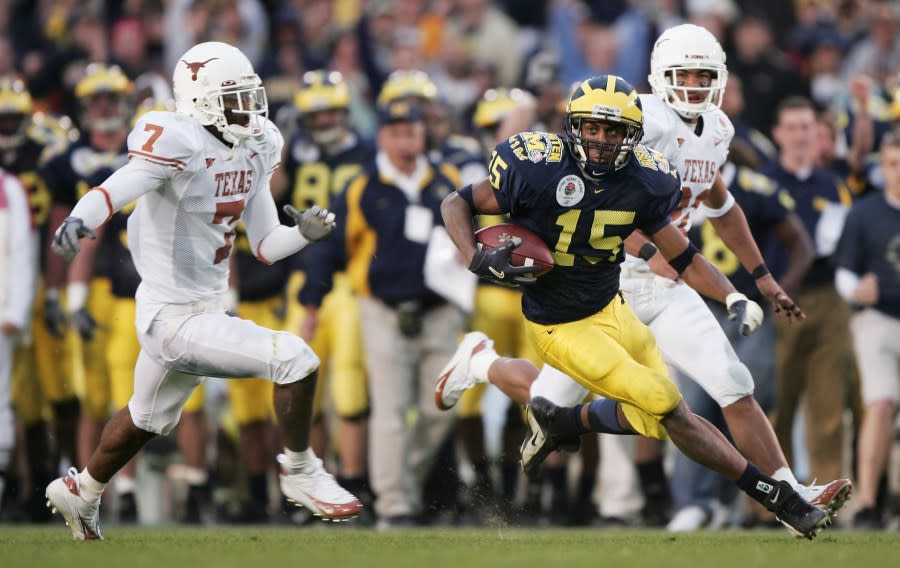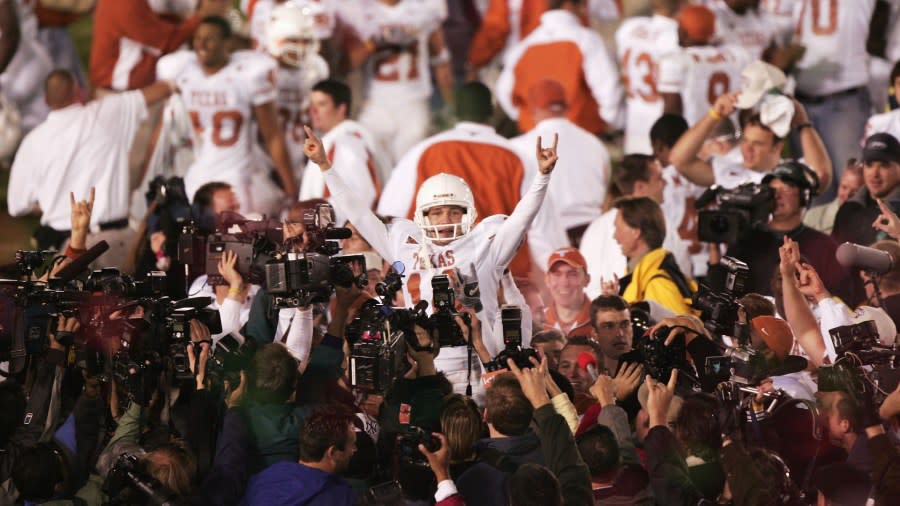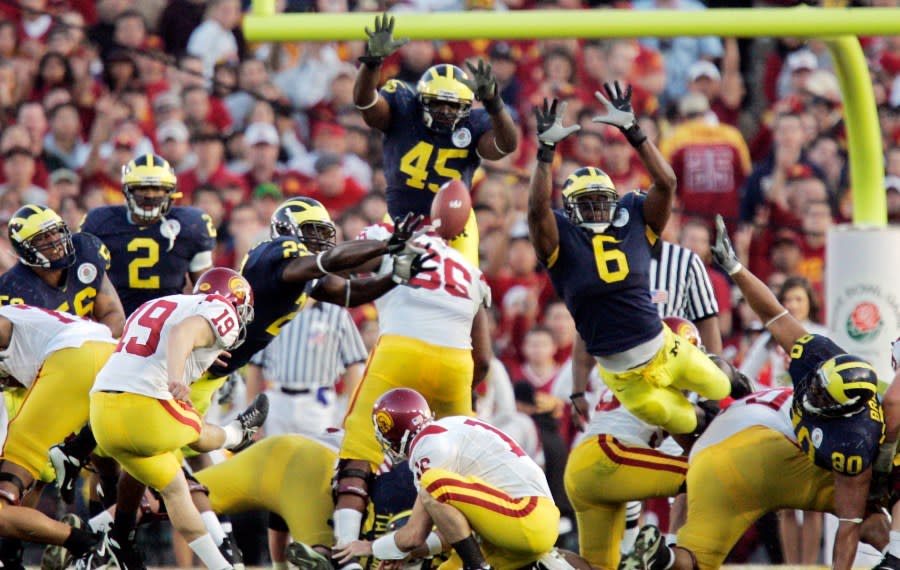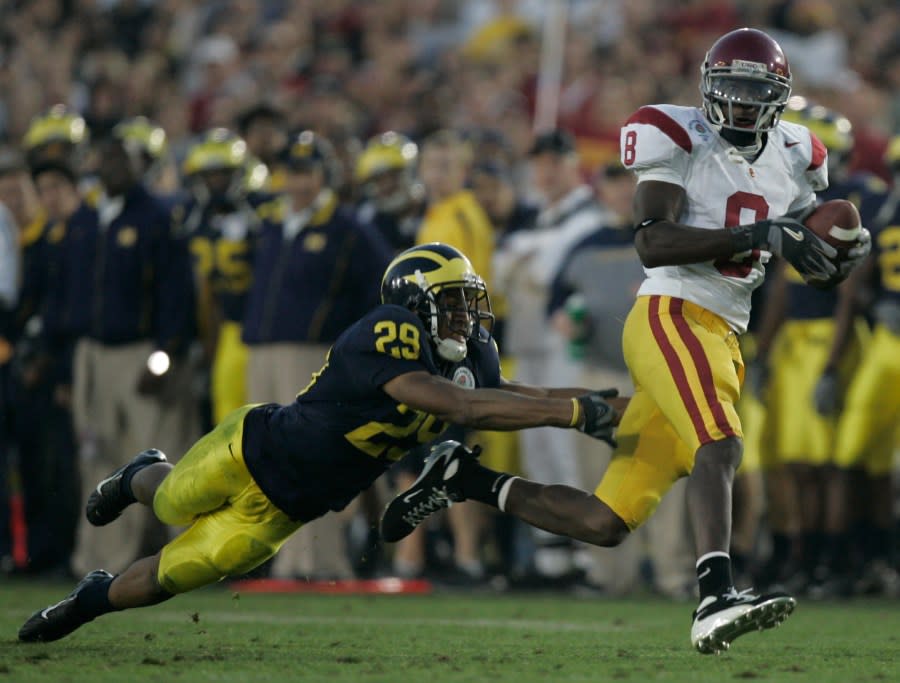Michigan’s long Rose Bowl history: Highs and lows

- Oops!Something went wrong.Please try again later.
- Oops!Something went wrong.Please try again later.
- Oops!Something went wrong.Please try again later.
- Oops!Something went wrong.Please try again later.
- Oops!Something went wrong.Please try again later.
- Oops!Something went wrong.Please try again later.
GRAND RAPIDS, Mich. (WOOD) — The Michigan Wolverines will play in their 21st Rose Bowl next week — the team’s first appearance in 17 years.
This year, the Rose Bowl serves as a College Football Playoff semifinal, and the Wolverines hope their long history in Pasadena helps put the team over the top. Michigan dominated the Rose Bowl in college football’s early days (as highlighted in Part 1), but recent history hasn’t been kind to the Maize and Blue.
Here’s a look at the Wolverines’ more recent experience in the Rose Bowl, starting with the Bo Schembechler era:
PERPLEXED BY PASADENA
The Bump Elliott era ended unceremoniously in 1968. The coach resigned following a 50-14 pounding at the hands of the hated Ohio State Buckeyes.
Looking to land a counterpunch in the heated rivalry, Michigan Athletic Director Don Canham hired Bo Schembechler to take over the team. Schembechler was an assistant coach under Ohio State’s Woody Hayes for several years before heading to Miami of Ohio and leading them to a pair of Mid-American Conference titles.
Bettors may not like the Wolverines to beat Alabama, but analytics do
Most Michigan fans expected a rebuilding year, but Schembechler and the boys exceeded expectations and then shocked the Buckeyes in his first year, scoring a 24-12 win over the defending national champions. Because of the conference’s bylaw that prevented teams from playing in back-to-back Rose Bowls, the Wolverines made the trip to California.
The 1970 Rose Bowl was Schembechler’s first of five Rose Bowls that decade — each ending in disappointment. Every game was close, but each time their Pac-8 opponent walked away with the win.
The toughest pill to swallow was the 1972 Rose Bowl. A showdown against 8-3 Stanford was the only thing standing in the way of the team’s first undefeated season and first national title since 1948.
Michigan’s long Rose Bowl history: The early years
The rain-soaked field made things harder on both teams. Michigan had some success running the ball, but the passing game was grounded. Stanford’s rushing attack stalled, but they were able to move the ball through the air.
The Wolverines held a 3-0 lead at the half and were inches away from a touchdown when Stanford’s defense made a goal-line stand. The two teams swapped touchdowns in the fourth quarter when Michigan seemingly caught a huge break. When Michigan kicker Dana Coin’s 42-yard field-goal attempt fell short, a Stanford player caught the ball and tried to return it, only to be tackled in the end zone, awarding the Wolverines a 2-point safety.
Michigan quarterback Don Moorhead runs around the edge during USC in the Rose Bowl on Jan. 1, 1970. The Wolverines came up just short in Bo Schembechler’s first Rose Bowl, falling 10-3. (AP file) A Michigan player leaps on a loose ball during the Rose Bowl on Jan. 1, 1972. Stanford eked past the Wolverines 13-12. (AP file) USC’s Vince Evans runs past a Michigan defender for a touchdown in the Rose Bowl on Jan. 1, 1977. USC beat Michigan 14-6. (AP file) The Washington defense forces Michigan quarterback Rick Leach to scramble in the Rose Bowl on Jan. 1, 1978. Washington won 27-20 to give the Wolverines their fourth consecutive Rose Bowl loss. (AP file) Michigan quarterback Rick Leach reaches out after fumbling the ball in the Rose Bowl on Jan. 1, 1979. Michigan retained possession but fell short to USC 17-10. (AP file)
But the Stanford defense forced a punt and marched down the field for one last drive. Quarterback Don Bunce completed 5 of 6 passes to get into the Michigan red zone. With 16 seconds to play, Stanford’s Rod Garcia nailed a 31-yard field goal to give his team a 13-12 upset victory.
Following the game, Schembechler shouldered much of the blame. Many fans and columnists criticized his conservative play-calling, something that would define his tenure at Michigan. It led the program to several big wins, but it burned them in the 1972 Rose Bowl.
“Stanford knew what was coming on every play and they were ready and able to stop it,” Michigan Daily columnist Mort Noveck wrote. “Bo has come in for a lot of criticism over his style. (As he has said), ‘You have to do what you do best.’ For the Wolverines, that was run the ball, and it worked 11 times but on the twelfth their best just wasn’t good enough.”
BO’S BREAKTHROUGH
It took a while for Schembechler to shake his Rose Bowl reputation. He finally got that elusive win in his sixth appearance.
The 1980 team started the season slow, but its defense started to jell and became one of the most dominant units in college football. Before the Rose Bowl, the defense went 15 consecutive quarters without allowing a point and shut down the Buckeyes for a 9-3 win.
The Washington offense put up a fight. The Huskies racked up 374 total yards — more than any other team that faced the Wolverines that year — but could only muster two field goals. It was the fifth consecutive game the Michigan defense didn’t give up a touchdown.
Bo Schembechler is carried off of the field after the Wolverines beat Washington 23-6 in the Rose Bowl on Jan. 1, 1981. It was Schembechler had been 0-5 in the Rose Bowl before that victory. (AP file) Michigan star wide receiver Anthony Carter evades a tackle attempt during the 69th Rose Bowl on Jan. 1, 1982. UCLA topped Michigan 17-10. (AP file) In a now iconic photo, Michigan head coach Bo Schembechler pulls his headset away to talk to quarterback Jim Harbaugh during the 1986 Rose Bowl against Arizona State. Harbaugh has revived the slumping Wolverines program and led them back to the Rose Bowl for the first time since 2006. (AP file) Bo Schembechler celebrates with the trophy after the Wolverines defeated USC 24-21 in the 1988 Rose Bowl. It was Schembechler’s first Rose Bowl win over USC in four tries. (AP file)
That was more than enough for the Michigan offense, who took the lead for good on a 7-yard touchdown catch by Anthony Carter. Stan Edwards punched in another score in the fourth quarter to ice the game away 23-6.
Afterward, Schembechler gave the credit to his players for rallying around each other, echoing his now iconic motto: “The team, the team, the team.”
“Other teams have had more talent. This team was a team, a true team in every respect,” Schembechler told the Michigan Daily.
The Wolverines came up short in their next two Rose Bowls, a 24-14 loss to UCLA and a 22-15 loss to Arizona State. Schembechler got his second — and final — Rose Bowl win in 1989, getting revenge on the team that handed him his first loss — USC.
Who are the victors? Reliving the Wolverines’ 1892 ‘win’ over Oberlin
Coming into the game, the buzz surrounded the Trojans’ defense and whether Michigan could muster enough offense to stay in the game. But just like the 1980 team, it was the Wolverines’ D that flexed the most muscle.
Despite having Rodney Peete, the Heisman Trophy runner-up, lining up under center, Michigan’s defense stood strong, limiting USC to 296 total yards and just two scores. In the second half, the Wolverines defense took over and gave the offense enough room to rally past the Trojans. Trailing 14-3 at the half, Demetrius Brown found Chris Calloway for a 6-yard score in the third quarter and Leroy Hoard cashed in two goal-line runs to give the Maize and Blue the 22-14 victory.
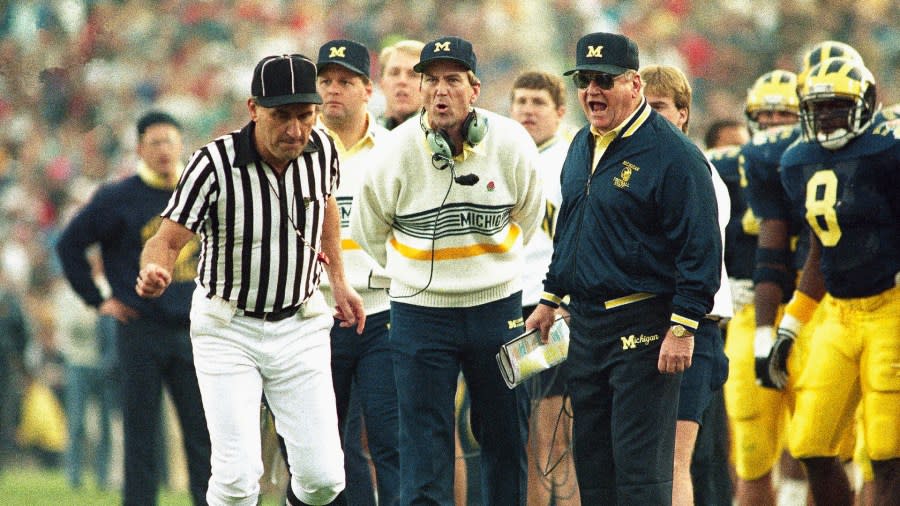
The two teams would meet again the next year. It was a typical Michigan Rose Bowl – a game dominated by defense and won in the trenches. This time USC came out on top, 17-10, but the loss didn’t linger for long. The Wolverines’ attention turned to the future.
Schembechler had already announced the Rose Bowl would be his last game on the Michigan sidelines. He was stepping down to serve full-time as the university’s athletic director, like Fritz Crisler before him.
Longtime assistant Gary Moeller was named his successor, tabbed to be the man to lead the Wolverines into the next decade and continue the program’s winning ways.
STABILITY AMIDST CHAOS
The Moeller transition was relatively smooth. The Wolverines continued to dominate the Big Ten, winning at least a share of the Big Ten in his first three years leading the program.
In his third year, Moeller’s Wolverines finally got over the hump, posting the team’s first undefeated season (9-0-3) since 1973, including a Rose Bowl win over Washington.
The Huskies beat Michigan in Pasadena the year before. But in the 1993 game, Moeller’s offense proved up to the task. While Washington relied on quarterback Mark Brunell, the Wolverines leaned on the run game, and Tyrone Wheatley dominated.
Sign up for the News 8 daily newsletter
Wheatly broke three big touchdown runs to help the Wolverines keep pace, including one from 56 and another from 88 yards out. The 88-yard run was a Rose Bowl record until it was broken by Oregon’s DeAnthony Thomas with a 91-yard play in 2012.
In the fourth quarter, Elvis Grbac found Tony McGee for his second touchdown of the day to give the Wolverines the lead for good, a 38-31 win.
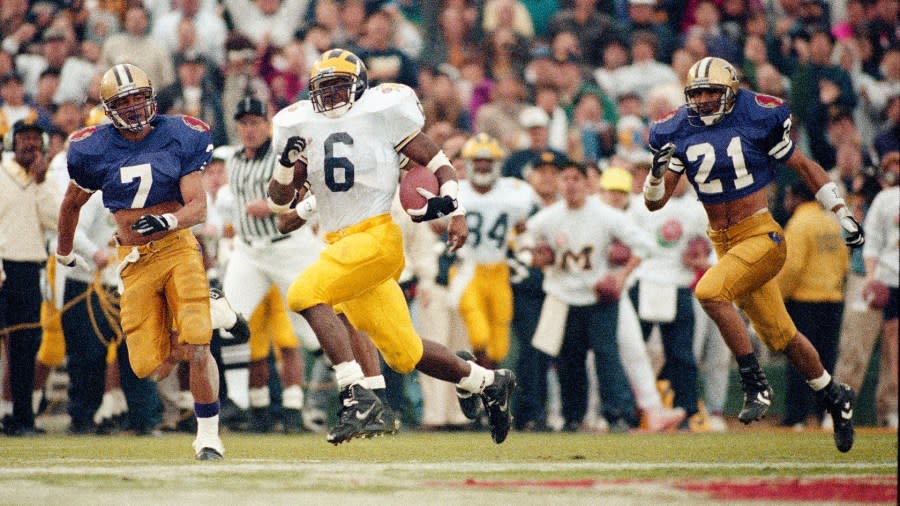
Moeller never returned to the Rose Bowl. A pair of 8-4 seasons kept him out of Pasadena, and he unceremoniously resigned in May of 1995, days after he was arrested following a drunken outburst at a restaurant — one that showed him belligerent and hitting a police officer.
Once again, the Wolverines tried to keep the train on the tracks by hiring a “Michigan Man” – someone who already understood the storied program and knew how to run it properly. Another longtime assistant, Lloyd Carr, was chosen to succeed Moeller. He brought arguably Michigan’s biggest Rose Bowl moment of all.
REACHING THE SUMMIT
After starting with two four-loss seasons, Carr faced a lot of questions heading into the 1997 season. The team was loaded with talent but had yet to get the big win.
In 1997, they did just that, holding off Michigan State, rallying past Iowa, dominating a top-5 showdown on the road against Penn State and standing strong against the Buckeyes, earning a 20-14 win and an 11-0 regular season.
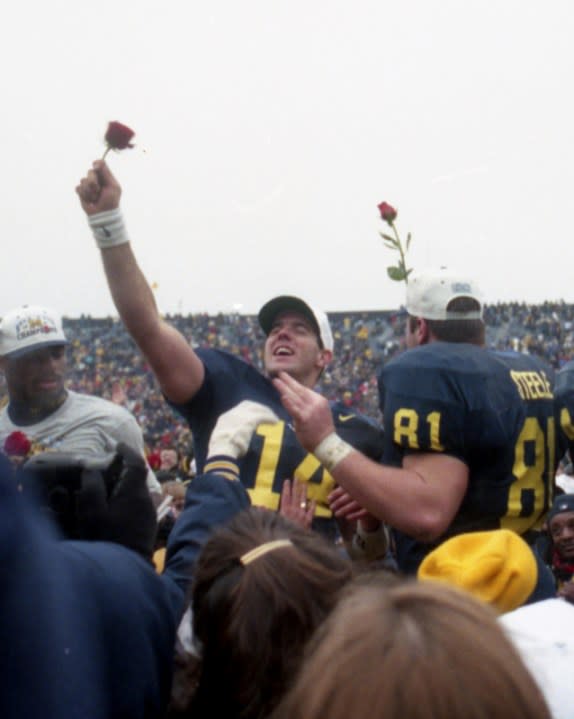
The Wolverines entered the 1998 Rose Bowl as the top team in the country and set to take on the Washington State Cougars, a Pac-10 Cinderella story. After back-to-back losing seasons, Wazzu stormed through the conference and posted a 10-1 record.
Quarterback Ryan Leaf, their own Heisman finalist, led a stellar offense that was matched against Michigan’s stout defense, including Heisman Winner Charles Woodson. Just like the big games they had won earlier that year Woodson would have his Heisman moment in Pasadena.
Washington State started hot. Leaf drove the field and hit Kevin McKenzie for a touchdown to open the scoring, and after forcing a punt, the Cougars threatened to take an early two-score lead. Playing in trail coverage, Woodson was able to make up ground and intercept a pass in the end zone to switch the momentum.
Michigan quarterback Brian Griese finally got things going in the air, hitting Tai Streets on two deep balls to take the lead. Early in the fourth quarter, holding a slim 14-13 lead, Griese led a long drive, then faked the hand off and found tight end Jerame Tuman for another touchdown.
The Cougars had one last drive to try and steal the game — and they almost did. On their own 7-yard line with 16 seconds to play, Leaf found Nian Taylor to get into Michigan territory. A lateral play got the Cougars down to the 16 with 2 seconds to play. Once the chains were set and the clock was restarted, Leaf snapped the ball and spiked it to stop the clock, but it hit zero and the referees declared the game over.
Michigan’s Charles Woodson leaps to make an interception in the end zone to prevent a Washington State touchdown during the 84th Rose Bowl on Jan. 1, 1998. The play proved key in the Wolverines’ 21-16 win that clinched a share of the 1997 national championship. (AP file) Quarterback Brian Griese celebrates with his teammates after scoring a touchdown during the Rose Bowl on Jan. 1, 1998. Michigan beat Washington State 21-16 to finish an undefeated season and win a share of the national championship. (AP file) Tight end Jerame Tuman brings in a touchdown pass in the third quarter of Michigan’s 21-16 win over Washington State in the Rose Bowl. (AP file)
The Washington State players and coaches were in disbelief, arguing the spike didn’t take 2 seconds. Michigan players and fans watching at home argued that the Cougars never should have had a chance to spike the ball anyway, noting a clear missed pass interference call on the Taylor catch. In a 2021 interview, Leaf told podcaster Rich Eisen that he is still upset by the call.
Nevertheless, the Wolverines had completed their perfect season. They won the Rose Bowl 21-16 and claimed a share of the national championship.
Michigan continued to thrive under Carr, but their success never translated into Rose Bowl wins. The Wolverines wouldn’t return until the 2004 game, a 28-14 loss to Matt Leinart’s USC Trojans.
They returned the following year and played a barnburner with Texas. Chad Henne threw four touchdown passes and an up-and-coming Vince Young proved to be a one-man scoring machine for the Longhorns. Up 37-35 with 3 minutes to play, Texas put together a 10-play drive that ended with a Dusty Mangum 37-yard field goal as time expired to walk away with a 38-37 win.
It wouldn’t be Carr’s last Rose Bowl. The game became a consolation prize for The Game in 2006. Both the Wolverines and the Buckeyes entered the season loaded with talent and with high expectations. Both teams followed through, entering the 2006 showdown undefeated: the top-ranked Buckeyes against the No. 2. Wolverines.
The game played out like a heavyweight fight, both teams exchanging blows, but a key penalty in the fourth quarter extended an Ohio State drive and the Buckeyes were able to hold on for a 42-39 win.
Michigan running back Chris Perry is buried under a group of USC defenders during the 2004 Rose Bowl. USC doubled up the Wolverines 28-14 in that game. (Getty Images file) Michigan quarterback John Navarre is sacked and fumbled by USC’s Will Poole during the Rose Bowl on Jan. 1, 2004. (Getty Images file) Michigan’s Steve Breaston runs past a Texas defender in the 91st Rose Bowl on Jan. 1, 2005. (AP file) Dusty Mangum celebrates after kicking the game-winning field goal to lead the Texas Longhorns past Michigan 38-37 in the 91st Rose Bowl. (AP file) USC’s Mario Danelo kicks a field goal during the Trojans’ 32-18 win over Michigan in the Rose Bowl on Jan. 1, 2007. (AP file) USC wide reciever Dwayne Jarrett eludes Leon Hall’s tackle attempt for a touchdown in the 93rd Rose Bowl on Jan. 1, 2007. The Trojans downed the Wolverines 32-18. (AP file)
Whether the devastating loss took the wind out of their sails or Carr’s conservative play calling had finally met its match, the Wolverines looked lifeless in Pasadena. Dwayne Jarrett racked up 11 catches for 205 yards and two touchdowns to lead USC past Michigan 32-18.
It was the end of an era. The following year, Carr announced his plans to retire. Instead of a “Michigan Man,” they made the splashy hire in Rich Rodriguez, looking to reinvigorate the program with a high-flying offense. After three unsuccessful seasons, they went back to the “Michigan Man” mold by hiring Brady Hoke. He lasted four seasons, with the team’s record getting worse in each consecutive season.
Finally, the athletic department married the two approaches. They hired a big-named coach with lots of promise who happened to be a Michigan Man: Jim Harbaugh. Eight seasons in, he has turned the program around, has won three consecutive Big Ten titles and now has his first chance at Rose Bowl glory leading the Wolverines.
Editor’s note: This is the second part of a two-part report. The first part can be found here.
For the latest news, weather, sports, and streaming video, head to WOODTV.com.
